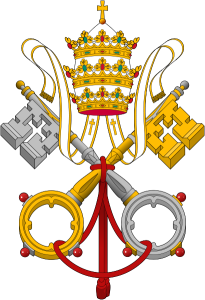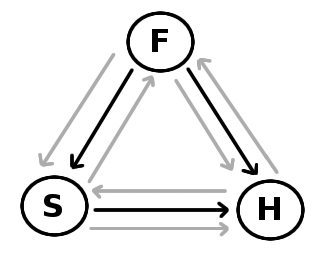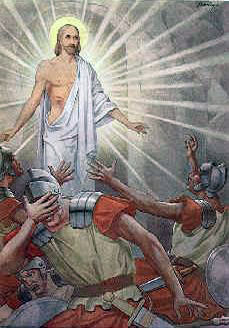David Kelley on How to Evaluate Definitions
How does one objectively evaluate a definition of a concept, e.g. trinitarian or unitarian?
How does one objectively evaluate a definition of a concept, e.g. trinitarian or unitarian?
It is impossible to ignore that prominently in the New Testament, two members of the trinity/Trinity interact in I-Thou, Me-You ways, as person to person, self to self. Thus, Jesus prays to his Father, and sometimes, the Father speaks about or to Jesus. This seems to presuppose that both Father and Son are selves. And in a few passages, “the Holy Spirit” is said to speak,… Read More »10 steps towards getting less confused about the Trinity – #5 “Persons” – Part 2
Dale writes: A self is being which is in principle capable of knowledge, intentional action, and interpersonal relationships. A god is commonly understood to be a sort of extraordinary self. In the Bible, the god Yahweh (a.k.a. “the LORD”) commands, forgives, controls history, predicts the future, occasionally appears in humanoid form, enters contracts with human beings, and sends prophets, whom he even allows to argue… Read More »Does God have a body?
Here is a guest post by Sir Anthony Buzzard. In it, he discuses what many would consider an obvious point, though some ignore or deny it: that the theology of Bible-era Judaism is monotheistic in a way that implies that the one God just is a certain mighty self. In Mark 12, Jesus simply affirms that theology. It is standard information in all the… Read More »Jesus’s Jewish error?

First, a few clarifications. By “modalist” I do not mean “Sabellian” or “monarchian.” (Those ancient catholics probably did hold to various forms of modalism, but the term is not a historical one, and can refer to other views which probably no ancient person held.) Nor do I mean modalism by definition to be heretical relative to orthodox/catholic creeds. What I mean is that at least one of these – Father, Son, Spirit – is a mode of the one God, in some sense a way that God is. That last phrase is deliberately ambiguous.
In his recent Christmas sermon the Pope said:
In all three Christmas Masses, the liturgy quotes a passage from the Prophet Isaiah, which describes the epiphany that took place at Christmas in greater detail: “A child is born for us, a son given to us and dominion is laid on his shoulders; and this is the name they give him: Wonder-Counsellor, Mighty-God, Eternal-Father, Prince-of-Peace. Wide is his dominion in a peace that has no end” (Is 9:5f.). … A child, in all its weakness, is Mighty God. A child, in all its neediness and dependence, is Eternal Father. …
God has appeared – as a child. It is in this guise that he pits himself against all violence and brings a message that is peace. (emphases and link added)
This last phrase, X has appeared as S, is ambiguous. It could mean Read More »Is the Pope a Modalist?
Richard Swinburne is one of the greatest living Christian philosophers, who has made immense contributions to philosophy of religion and philosophical theology. It is only idolatry of the past that prevents people from seeing him as great a Christian intellectual as Origen, Augustine, Aquinas, or Leibniz. In my view, he’s plainly a better, clearer, more well-rounded philosopher than any of them. “A prophet is honored… Read More »Is God a Self? – Part 7 – Swinburne

How the three are tightly functionally unified, in Swinburne’s view.
(See below for the interpretation.)
Last time we looked at Swinbure’s suggested reading of the creeds. They can’t he says, be charitably read as holding that in the same sense there’s only one divinity, and that there’s three. Swinburne comes down on the side of three. Like all social trinitarians, he’s attracted to a vision of the Trinity as being a loving community, three eternal and perfect, spirits, three selves, enjoying one another’s company, living in communion with one another, and working together in all they do. In short, he wants to say there are personal relationships internal to God – and this implies that there are persons – subjects of experience, thought, and action – in God.Read More »Swinburne’s Social Trinitarian Theory, Part 3 – functional monotheism
Is Ned in trouble? Here’s a quick post to wrap up the series on Brower’s and Rea’s constitution theory of the Trinity. First, it’s striking how original and self-consistent their approach is. It is rare to find something this new, and this well thought through on such an old topic. They’ve carefully carved out a unique position, one which has a motivation outside of theology… Read More »Constitution Trinitarianism Part 6: summing up
For a few of the most serious and clever among us, mystery-mongering dies hard. They will stubbornly resist my previous attack on positive mysterianism about the Trinity, kicking back hard. I knew all along that the Trinity was going to be mysterious. And so now that I’ve discovered one way in which it is mysterious, well, I do celebrate it. You can rub my face… Read More »10 steps towards getting less confused about the Trinity – #3 Take the mystery out of appeals to “mystery” – Part 4
…let me comment on your later post where you explained, on a biblical level, what pointed you to converting to Orthodoxy…
 I woke up this morning, and realized that there is a problem with how I’ve been defining the concept of a unitarian. In this post, I will attempt a definition of the concept of a trinitarian, after reviewing what is required of a good definition. Next time, I’ll try to define the concept of a unitarian.
I woke up this morning, and realized that there is a problem with how I’ve been defining the concept of a unitarian. In this post, I will attempt a definition of the concept of a trinitarian, after reviewing what is required of a good definition. Next time, I’ll try to define the concept of a unitarian.
According to the textbook I have used for years in my critical thinking class, a good definition should:
What is a trinitarian?
Definition 1: someone who believes in a triune god.
Brian Leftow is recognized as one of the most important living Christian philosophers. Formerly of Fordham University in NYC, he now holds the prestigious Nolloth Chair of the Philosophy of the Christian Religion at Oriel College, Oxford. See Trent Dougherty’s comments here for a list of some of his publications. In person, Leftow is very pleasant and interesting, and his sense of humor also comes… Read More »Leftow 1: “Anti Social Trinitarianism”
In his sixth and final installment of the debate, Bowman turns in his finest performance, making a number of interesting moves, and getting some glove on Burke. First, he tweaks his formula (here’s the previous version): The doctrine of the Trinity is biblical if and only if all of the following propositions are biblical teachings: One eternal uncreated being, the LORD God, alone created all… Read More »SCORING THE BURKE – BOWMAN DEBATE – ROUND 6 Part 2 – Bowman
“It’s not identification, but rather predication.”
Awhile back I provided links to some good, thought provoking commentary by Christian philosophers. Now, some other excellent pieces I’ve read, by philosophers and not. I think Christian philosopher Dr. Kelly James Clark hits the nail on the head: …many Christians mistakenly assume that two people worship the same God only if they have identical or nearly identical descriptions of God. This assumption, which may… Read More »another Doc Hawk / “one god” Wheaton controversy round-up

Of all the ancient catholic “fathers” I’ve read, Origen (c.185-254) is the most impressive as a scholar.
It’s not that I usually agree with him – any non-Platonist is going to choke on many of the dishes he’s serving, and I think that most today would take issue with some his ways of interpreting the Bible. But he has vast knowledge, he makes pretty careful distinctions, he knows how to argue, and is just a much more developed and original thinker than most. Any contemporary who was going to square off with him either did or should have considered him a formidable opponent.
He wrote, or rather dictated, a vast amount – evidently, he did little else. Some think he may have been the most prolific person in antiquity. We still have a fair number of texts from him.
He’s historically important for many reasons, but for this post, what’s most important is that in the 3rd century he was considered a stalwart of mainstream (“catholic”, or “proto-orthodox”) Christianity.
Lately I’ve been reading Origen’s Commentary on John, as translated by Ronald E. Heine, who by way, I have found very helpful. He too is a first-rate scholar.
Evidently, passage here is directed against certain monarchians who thought (or at least, were alleged to think) that the Father = the Son, i.e. that the Son is the Father himself and vice versa. This passage struck a nerve with me, as it reminded me of conversations I’ve had.
The references in brackets are from Heine’s footnotes.Read More »Origen: the Son is not the Father
In this post, I’ll take a crack at summarizing a lengthy salvo against Trinity monotheism launched by Daniel Howard-Snyder. Dan is well known and respected for his work on the problem of evil and in theory of knowledge. He has a hard-hitting and thorough style, very Alstonian (which is no accident). Generally, Dan is a nice guy, with a good sense of humor to boot.… Read More »Trinity Monotheism part 6: Attack of the Dan
“It seems that Dr. Craig…in his attempt to equalize the persons has not only failed to elevate Jesus to the status of a god but has brought the Father down to his level. It is a reverse homoousion…”
“…earliest believers treated the risen/exalted Jesus as they did only because they felt required to do so by God.”
In thinking about the Trinity, 380 and 381 are perhaps the most important dates to remember.